Tunisia
The 2030 Agenda and Tunisia
Published on Thu, 2020-05-14 12:11
The COVID-19 health crisis added to the multidimensional crises in the Arab region and their manifestation in conflicts, wars, economic and social inequalities, and the increasing number of refugees and migrants. It could lead to severe repercussions at the economic, social, and political levels. According to an ESCWA preliminary estimate, the region will lose at least USD42 billion in 2020 due to the Corona pandemic. ESCWA also considered that the global spread of the virus and the growing impact of low oil prices could aggravate income losses. Unemployment is expected to increase by 1.2 percentage points, meaning the loss of around 1.7 million jobs. The Arab region registers some of the highest rates of inequality around the world, and informal employment accounts for 50% of jobs. It also lacks universal social protection systems and is thus unable to protect workers and ensure their dignity during work stoppages.
|
Published on Mon, 2017-10-30 09:02
The implementation of the 2030 Agenda in Tunisia suffers from almost the same challenges encountered by the rest of the Arab economies. It is not legally binding and it provides the government only with guidelines. It also remains dependent on the good will of the government and its own priorities. It is subject to different threats such as instability, regional conflicts, immigration and displacements, demographic movements, social inequalities, economic crises and high public indebtedness. The economic crisis and the lack of funding sources are often mentioned to justify the incapacity of the Tunisian government to invest in infrastructure and development projects.
|
Published on Wed, 2017-09-27 15:09
The Arab NGO Network for Development (ANND) launched a book on the enabling environment of civil society in the Arab region. The publication aims to present an overview of the current situation of civil society organizations in Tunisia, Egypt, Lebanon, Iraq, Syria, and Palestine. It uses several country-specific indicators regarding the establishment of civil society organizations and their success. The current conflicts raging in the Arab region constitutes a serious challenge, especially in lack of attention to laws regarding the work of civil associations, in addition to the shifts faced in funding.
The publication highlights several legal challenges, especially those resulting from the lack of commitment to the principles of the separation of powers, as applied by democratic societies, as laws and regulations are often politicized. The book includes several recommendations to invigorate the work of civil society organizations in the regional, in order to consolidate the values of justice, equality, and sustainable development.
|
Published on Fri, 2015-07-03 13:26
The peoples’ uprisings in the Arab region presented a golden occasion for revisiting the European Neighborhood Policy (ENP) and particularly the partnership between the Arab countries and the European Union (EU). The Joint Communication of the High Representative and European Commission, “A New Response to a Changing Neighborhood, ” highlighted important lessons learnt but remained an exercise of self-assessment without the engagement of EU partners and relevant stakeholders (including civil society) for what are widely considered today as major historical changes in the Arab countries.
|
Published on Tue, 2014-12-23 09:28
For the fourth successive year, a delegation of human rights and development civil society organizations from the Arab region will be visiting the European institutions in Brussels between the 8th and the 12th of December 2014. The Arab delegation includes civil society representatives from Egypt, Jordan, Palestine, Morocco, Syria, Tunisia and Lebanon.
This visit seeks to provide a platform for dialogue and exchange between civil society organizations from the Arab region and European policy makers at the Parliament and Commission around the EU’s support and involvement in the region.
|
Published on Fri, 2012-11-16 07:16
Access to state-provided abortion services has worsened since the Tunisian Revolution, according to the Tunisian Association of Democratic Women (ATFD). residents of some regions in the country, especially in the South and the North West, have complained that abortion services have not been available since the Revolution.
|
Published on Tue, 2012-10-16 08:17

Manifestation in memory of
victims in violence,
(Photo: S. Rougeaux/ASF)
|
Eight Tunisian human rights associations, headed by Avocats Sans Frontières, have categorized 7,454 cases of human rights violations and filed them into databases. A better knowledge of that information will contribute to the transitional justice process currently underway in the country that is the beacon of hope for the Arab Spring.
|
Published on Fri, 2012-09-28 10:53
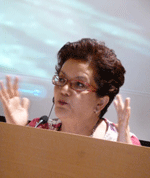
Zeyneb Farhat, ATFD.
(Photo: Isart)
|
Tunisian civil society is rallying in support of a 27 years-old woman who accused two policemen of raping her on September 3. The woman and her fiancé were summoned by a judge on Wednesday to face charges of “indecency” brought by those officers. Leading non governmental organizations, including the Tunisian Association of Democratic Women (ATFD) and the Tunisian League of Human Rights (LTDH), have formed a committee to co-ordinate a campaign to defend the couple.
|
Published on Fri, 2012-08-03 15:34

Photo: Women in the Mediterranean
|
The newly written constitutional clause protecting women’s rights in the Tunisian constitution has angered feminists and opposition politicians with wording that calls women the “associate” of man, reported journalist Mischa Benoit-Lavelle on Tunisia Live news portal.
|
Published on Thu, 2012-02-16 07:30

Photo: Tunis-Afrique Press
|
The situation of media in post-Revolution Tunisia and ways to promote it were discussed at a meeting attended by National Constituent Assembly (NCA) members, representatives of the Tunisian General Labour Union (UGTT), the National Independent Council for Information and Communication and the Tunisian League for Human Rights (LTDH, member of the Social Watch national coalition).
|
Published on Tue, 2012-01-31 07:43
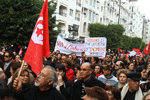
Photo: TunisiaLive
|
Thousands of demonstrators chanted “No to violence”, ”No to extremism”, “No Niqab, no to Salafism” and “Universities are free, extremism out,” at a march that took place in Tunis last Saturday, convened by political parties, unions and civil society organizations calling for freedom of expression. Violations and assaults committed by a group of Salafists against residents of Sejnane were confirmed by Abdel Sattar Ben Moussa, President of the Tunisian League of Human Rights (LTDH, one of the national focal points of Social Watch).
|
Published on Mon, 2011-12-19 14:20
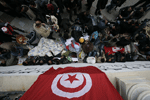
Photo: Government in the Lab
|
The news has been filled with contention over Egypt’s November elections, but far less attention is being paid to the voting in Tunisia—also recently liberated from the rule of a dictator. In her analysis for Owni.eu and Government in the Lab magazine, Mary Elizabeth King recounted the democratization process and remarked the role of the Tunisian League for Human Rights, focal point of Social Watch in that country.
|
Published on Tue, 2011-11-08 07:44

Photo: Women in the Mediterranean
|
The Tunisian Association of Democratic Women (ATFD, one of the focal points of Social Watch in that country) created an “emergency cell” to take statements of women who suffer assaults in the university campuses and to offer them support and solidarity.
The last incidents, according to the French newspaper L’Humanité, took place in the Manouba School of Economics and the High Institute of Theology.
|
Published on Mon, 2011-10-31 07:28
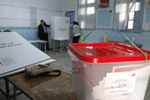
Photo: Tunivisions
|
A preliminary report on the elections of the National Constituent Assembly drawn up by the Tunisian League for Human Rights (LTDH, one of the focal points of Social Watch in this arab country) revealed the existence of infringements and shortcomings during the polls and the vote counting, noting, however, that they had not impacted on the electoral process, according to Tunisian News Agency (TAP).
|
Published on Tue, 2011-09-27 09:24
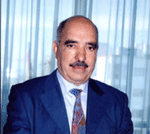
Abdessatar Ben Moussa.
(Photo: Chawkitabib.info)
|
The implementation of an observatory to monitor next month’s elections is the current priority of the Tunisian League for Human Rights (LTDH, one of the focal points of Social Watch in that country), announced its new chairperson, Abdessatar Ben Moussa.
|
Published on Mon, 2011-09-12 08:31
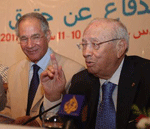
Outgoing LTDH president Mokhtar
Trifi and interim prime minister
Beji Caed Essebsi.
(Photo: TunisiaLive)
|
Sources: Associated Press, TunisiaLive, Agence Tunis Afrique Presse, Leaders, in French
The Tunisian League for Human Rights (LTDH, one of the focal points of Social Watch) held its annual congress for the first time in 11 years from Friday to Sunday. The group, barred from carrying out all activities under president Zine El Abidine Ben Ali’s regime, called on the country's next authorities for an independent justice system, respect for women's rights and the end of capital punishment.
|
Published on Mon, 2011-06-27 10:52

Bachelet in Tunisia.
(Photo: TAP)
|
Sources: Agence Tunis Afrique Presse, TunisiaLive, UNWomen.
“From Tunisia and Egypt to Syria, Yemen, Libya and Bahrain, women have been active participants, calling for democracy, dignity and equality,” said Michelle Bachelet, UN Women Executive Director, at an international conference organised by the Tunisian Association of Democratic Women, national focal point of Social Watch in that country.
|
Published on Thu, 2011-05-26 07:19
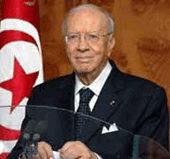
Prime Minister Béji Caïd Essebsi.
(Photo: Government of Tunisia)
|
Source: World Organisation Against Torture
The Tunisian transitional government will deposit this week the ratification documents for the Optional Protocol to the UN Convention Against Torture at the United Nations in New York. A mission of experts of the World Organisation Against Torture (OMCT), an international coalition of NGOs, made the announcement public this Monday, after visiting this North African country and meeting with representatives of the new authorities.
|
Published on Fri, 2011-05-06 12:50
Source: Agence Tunis Afrique Press (TAP): http://bit.ly/m3izfC
The Tunisian League for Human Rights (LTDH, national focal point of Social Watch) denounced "the repeated assaults questioning religious beliefs and opinions of individuals and groups by adopting a religious discourse," reports TAP news agency.
The LTDH called upon authorities to "put an end to torture, arbitrary arrests and violation of criminal proceedings," emphasising the need to respect the physical integrity and ensure fair trials, according to the report of TAP (Tunis Afrique Presse News Agency).
|
SUSCRIBE TO OUR NEWSLETTER
Submit
|



















